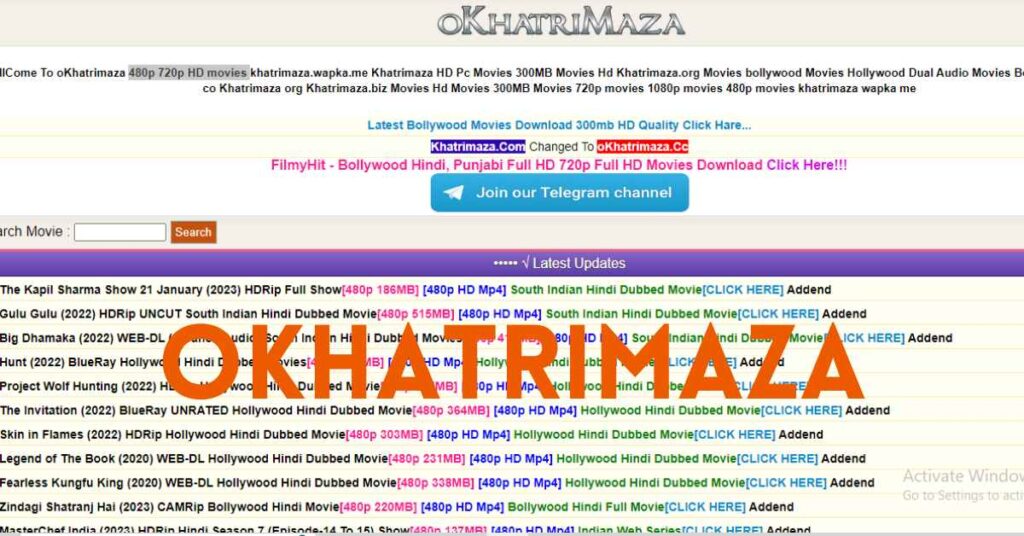Is the allure of instant gratification and readily available entertainment truly worth the potential risks? The relentless pursuit of accessing the latest Bollywood and South Indian movies, often through illegitimate channels, poses a significant threat to the creative industries and the very fabric of ethical online behavior.
The digital age has ushered in an unprecedented era of accessibility, where a vast library of content, from the newest Bollywood releases to the latest South Indian blockbusters, is just a click away. Platforms like Netflix offer a curated selection of films, including dubbed versions, catering to a diverse audience. However, the convenience of streaming services and official movie downloads is often overshadowed by the temptation to bypass legal avenues. Websites promising free access to movies, often featuring pirated content, proliferate the internet, enticing users with the promise of instant entertainment. Searching for "Bollywood movies online," "upcoming Indian movies," or "South Indian films dubbed in Hindi" frequently leads to a labyrinth of illegal download sites, mirroring the challenges faced by the film industry in combating piracy.
One of the most prominent examples of this phenomenon is the persistent presence of websites dedicated to providing illegal downloads. Platforms such as "Khatrimaza," notorious for hosting pirated content, continue to operate despite efforts to curb their activities. The search queries for "South Indian hindi dubbed movie download Khatrimaza," "Khatrimaza 2024 movie dubbed in hindi," and similar phrases are testament to their popularity, highlighting the ongoing demand for free access to copyrighted material. These websites often lure users with promises of HD quality downloads, including "480p," "720p," and "1080p" versions, as well as "webrip," "dvdrip," and "bluray" rips. The availability of such content fuels the cycle of copyright infringement and undermines the efforts of filmmakers and distributors to monetize their work. Websites like Khatrimaza offer a variety of original movies.
These sites are often designed to appear legitimate, mimicking the aesthetics of official streaming platforms. The interface is typically user-friendly, with categorized listings, search functions, and download links. The illusion of legality is further enhanced by the inclusion of movie posters, trailers, and plot summaries, which all contribute to the overall impression that users are engaging in a safe and harmless activity. However, the reality is far different. Downloading movies from these websites often exposes users to malware, viruses, and other security risks. Additionally, the act of downloading or streaming pirated content is a violation of copyright law, and users who engage in such activities risk legal repercussions.
The focus on immediate access often blinds users to the significant consequences of piracy. The film industry, a major source of employment and economic activity, suffers greatly from the proliferation of illegal downloads. Piracy deprives filmmakers, actors, technicians, and distributors of their rightful earnings, hindering their ability to invest in future projects and create new content. Furthermore, it leads to a decline in the quality of content available, as studios and producers are less likely to take risks when their work is constantly being stolen. The long-term impact of piracy extends beyond the entertainment industry, potentially stifling creativity and innovation across a range of cultural sectors.
The challenge of combating piracy is multifaceted, requiring a combination of legal, technological, and educational initiatives. Copyright enforcement agencies work to identify and shut down illegal websites, but the operators of these platforms are often adept at evading detection and relocating their activities to different servers. Technological solutions, such as digital watermarking and content protection systems, help to prevent unauthorized copying and distribution of movies. However, no single solution is foolproof, and pirates are constantly seeking ways to circumvent these measures. Educating the public about the harms of piracy and promoting the use of legal streaming services are crucial steps in changing user behavior. A shift in perspective is necessary, with a move away from the culture of expecting everything for free to an understanding of the importance of supporting creators and the creative industries through legitimate channels.
The availability of South Indian films dubbed in Hindi on platforms such as Netflix offers a convenient and legal way for audiences to enjoy these movies. Netflix's official website provides a curated selection of both new releases and classic films, complete with high-quality streaming and user-friendly interfaces. The subscription-based model provides a sustainable way for the film industry to generate revenue while also giving viewers access to a wide range of content. In addition to Netflix, other legal streaming platforms and online movie stores provide access to various Bollywood and South Indian films.
The contrast between the legitimate offerings of platforms like Netflix and the dubious practices of websites like Khatrimaza is stark. While Netflix invests in acquiring licenses, producing original content, and providing a secure and user-friendly experience, Khatrimaza and similar sites operate on a foundation of illegality, risking the safety of their users and harming the creative industries. The choice, ultimately, rests with the individual user. The pursuit of entertainment should not come at the expense of ethical principles or the well-being of the industry. A responsible approach involves supporting legal platforms and services, recognizing the value of creative work, and avoiding the allure of free downloads that may come with hidden costs.
The evolution of the internet has made it increasingly difficult to control the distribution of copyrighted material. However, the responsibility to act ethically rests with each individual. Users must make informed decisions about how they consume media and recognize the potential consequences of their actions. Embracing legal platforms and supporting the creative industries is the only sustainable path forward. As the demand for movies continues to grow, so must the commitment to protect the rights of creators and ensure the continued flourishing of the cinematic arts.
The pursuit of instant gratification, fueled by the desire to watch movies for free, has led to the widespread use of illegal download sites and the infringement of copyright laws. From the latest Bollywood releases to South Indian blockbusters, these websites offer a range of content, including dubbed versions, enticing users with the promise of easy access. However, this short-term convenience comes at a considerable cost, with potential legal ramifications, security risks, and detrimental impacts on the film industry.
The existence of platforms like Khatrimaza, with its numerous mirror sites and variations, exemplifies the challenges faced in combating piracy. Despite efforts to block access and shut down illegal operations, new sites emerge constantly. The attractiveness of free content and the lack of awareness regarding the legal and ethical implications fuel this continuous cycle. Users searching for "Khatrimaza 2024 latest hd movies download" or similar queries are often led down a path of potential harm, exposing themselves to malware, viruses, and the risk of legal penalties.
The availability of movies online, both legally and illegally, has changed the landscape of entertainment. For legitimate users, platforms such as Netflix and other streaming services offer a convenient and high-quality viewing experience, providing a curated selection of movies in addition to original content. These platforms are built on the foundation of licensing agreements, protecting copyright, and ensuring that creators receive fair compensation for their work.
The contrast between legitimate and illegal channels is stark. One represents respect for creativity, ethical behavior, and user safety, while the other promotes piracy, puts users at risk, and undermines the film industry. Making the correct choice comes down to a fundamental understanding of value and consequence. It requires a commitment to supporting legitimate platforms, recognizing the value of creative work, and avoiding the trap of free downloads that often come with hidden costs.
To combat piracy effectively, a multi-pronged approach is necessary. Copyright enforcement agencies must continually work to identify and shut down illegal websites, while technological advancements such as digital watermarking and content protection systems will help deter unauthorized copying and distribution. However, legal measures and technical solutions alone are not enough. Public education plays a vital role in creating awareness about the harms of piracy and the benefits of supporting legal platforms. A shift in perspective is required to move away from the idea that everything should be available for free and to encourage respect for creators and the creative industries.
The increasing complexity of the digital landscape requires consumers to be increasingly vigilant. It is essential to recognize the difference between legal and illegal platforms, understand the risks of downloading pirated content, and support those who are producing and distributing content legally. The future of the film industry and the availability of high-quality movies depend on the choices made by individuals. As the world of entertainment evolves, the importance of ethics and responsible consumption will only increase.
The phrase "We did not find results for:" serves as a recurring indicator of the limitations encountered when searching for specific content on the internet. Whether it is due to spelling errors, outdated search terms, or the non-existence of certain content, these phrases highlight the challenges of navigating the vast digital space. Similarly, phrases such as "Check spelling or type a new query" and "Try the suggestions below or type a new query above" serve as prompts for users to refine their search strategies.
It's important to note that a website like Khatrimaza is not just a simple platform for downloading movies; it is a reflection of a wider cultural trend where the desire for instant gratification often trumps the recognition of ethical and legal boundaries. The continued existence of such sites underscores the need for sustained efforts in copyright enforcement, technological protection, and public awareness campaigns. Only through a collective commitment to responsible behavior can the film industry thrive and users be protected from the risks associated with illegal content.
The core of the issue is simple: the choice between supporting a creative industry, or participating in the illegal distribution of copyrighted content. Users are faced with a clear decision: to embrace the ethical and legal options available or risk the consequences that come with pirated content. This choice affects the future of creativity, the safety of the digital landscape, and the sustainability of the entertainment industry. The question is, which path will consumers choose?


